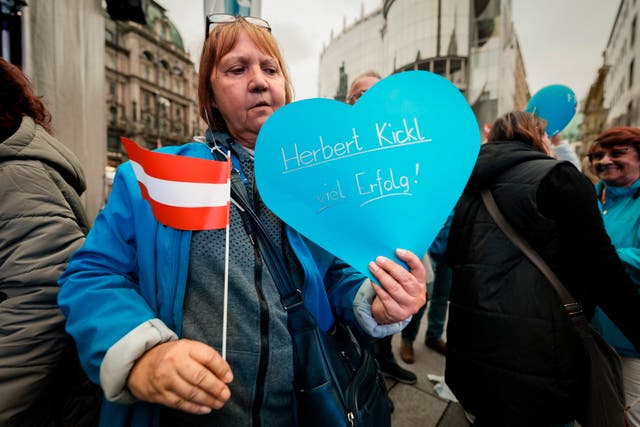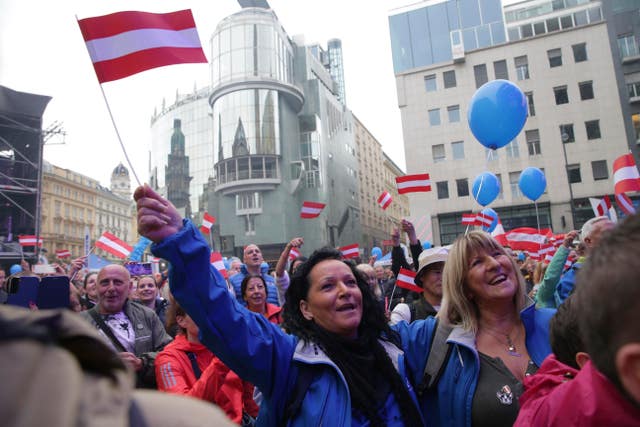In June, the Freedom Party narrowly won a nationwide vote for the first time in the European Parliament election, which also brought gains for other European far-right parties.
In 2019, its support slumped to 16.2% after a scandal brought down a government in which it was the junior coalition partner. Then-vice chancellor and Freedom Party leader Heinz-Christian Strache resigned following the publication of a secretly recorded video in which he appeared to offer favours to a purported Russian investor.
The far right has tapped into voter frustration over high inflation, the war in Ukraine and the Covid pandemic. It also been able to build on worries about migration.
The Freedom Party has called for “remigration of uninvited foreigners” and for achieving a more “homogeneous” nation by tightly controlling borders and suspending the right to asylum via an “emergency law”.
The party also calls for an end to sanctions against Russia, is highly critical of western military aid to Ukraine and wants to bow out of the European Sky Shield Initiative, a missile defence project launched by Germany.
 Astrid holds a heart shaped balloon with a good luck wish for Herbert Kickl, leader of the Freedom Party of Austria, during his final electoral campaign rally, held outside the St Stephen Cathedral, in Vienna (Andreea Alexandru/AP)
Astrid holds a heart shaped balloon with a good luck wish for Herbert Kickl, leader of the Freedom Party of Austria, during his final electoral campaign rally, held outside the St Stephen Cathedral, in Vienna (Andreea Alexandru/AP)
Andreas Babler has ruled out governing with the far right and labelled the Freedom Party leader “a threat to democracy”.
The popularity of Mr Nehammer’s People’s Party, which leads a coalition government with the environmentalist Greens as junior partners, has declined since 2019.
During the election campaign, Mr Nehammer portrayed his party which has taken a tough line on immigration in recent years, as “the strong centre” that will guarantee stability amid multiple crises.
Under their leadership, Austria has experienced high inflation averaging 4.2% over the past 12 months, surpassing the EU average.
 Supporters wave Austrian flags during the final election campaign event of the Freedom Party (Heinz-Peter Bader/AP)
Supporters wave Austrian flags during the final election campaign event of the Freedom Party (Heinz-Peter Bader/AP)
Mr Nehammer is the third chancellor since the last election, taking office in 2021 after predecessor Sebastian Kurz — the winner in 2019 — quit politics amid a corruption investigation.
He said in a video on Thursday that “this is about whether we continue together on this proven path of stability or leave the country to the radicals, who make a lot of promises and don’t keep them”.
The People’s Party is the far right’s only way into government.
Mr Nehammer has repeatedly excluded joining a government led by Mr Kickl, describing him as a “security risk” for the country, but has not ruled out a coalition with the Freedom Party in and of itself, which would imply Mr Kickl renouncing a position in government.
Should the People’s Party finish first, the most probable alternative would be a three-way alliance between the People’s Party, the Social Democrats and most likely the liberal Neos.
Source link : http://www.bing.com/news/apiclick.aspx?ref=FexRss&aid=&tid=66f8ec0dae094b8b9bd62fa1ea35f6ba&url=https%3A%2F%2Fguernseypress.com%2Fnews%2Fworld-news%2F2024%2F09%2F29%2Faustrian-far-right-party-eyes-win-in-close-election-race%2F&c=5809076463302544025&mkt=de-de
Author :
Publish date : 2024-09-28 22:11:00
Copyright for syndicated content belongs to the linked Source.


